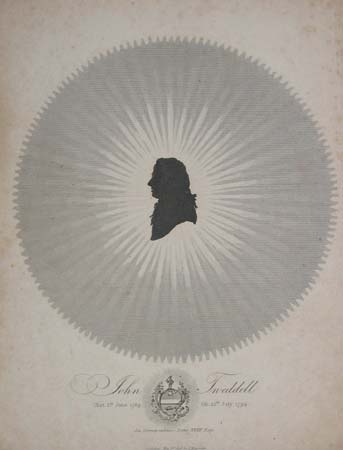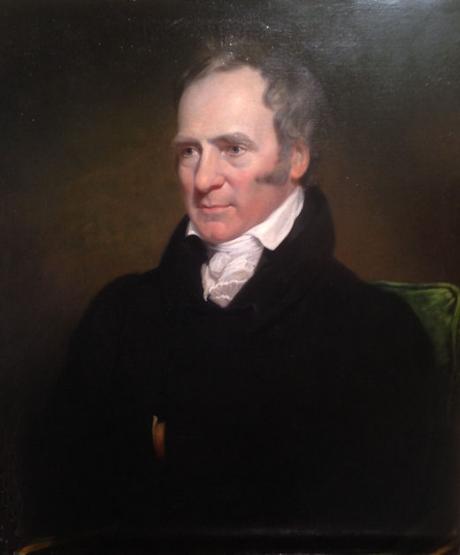|
John Tweddell
John Tweddell (1769–1799) was an English classical scholar and traveller. Early life The son of Francis Tweddell, he was born on 1 June 1769 at Threepwood, near Hexham, Northumberland. He was educated at Hartforth school, near Richmond, Yorkshire, under Matthew Raine (father of Matthew Raine FRS), at Hatton, Warwickshire under Samuel Parr, and at Trinity College, Cambridge. He graduated B.A. and won the second chancellor's medal in 1790, proceeding M.A. in 1793. He gained all the Browne medals in 1788 and two of the three in 1789, and the members' prize in 1791. He was elected Fellow of Trinity in 1792. Tweddell had been a pupil of the reformer Thomas Jones, who had backed him for the fellowship. In a Latin prize essay read out in a crowded Cambridge Senate House in 1792, on the topic ''An imperium magnum cum æquâ omnium Libertate constare possit?'' (Can a great empire exist with equal freedom for all?), Tweddell supported liberty. London radical Tweddell entered the M ... [...More Info...] [...Related Items...] OR: [Wikipedia] [Google] [Baidu] |
James Losh
James Losh (1763–1833) was an English lawyer, reformer and Unitarian in Newcastle upon Tyne. In politics, he was a significant contact in the North East for the national Whig leadership. William Wordsworth the poet called Losh in a letter of 1821 "my candid and enlightened friend". Early life He was the second son of John Losh of Woodside, Wreay in Cumberland, born on 10 July 1763; John Losh (1756–1814), his elder brother, was father of Sara Losh, while William Losh was a younger brother. His mother was Catherine ''née'' Liddell, and Joseph Liddell the industrialist and banker was his uncle. With his brother John, Losh had instruction from the local curate, William Gaskin, and then went to the academy of John Dawson. He was trained up for university at school in Penrith, and matriculated in 1782 at Trinity College, Cambridge. John Tweddell was a close friend from college, as was John Bell the barrister. Another friend from this time was Charles Warren. Losh graduated B. ... [...More Info...] [...Related Items...] OR: [Wikipedia] [Google] [Baidu] |
Jacques Necker
Jacques Necker (; 30 September 1732 – 9 April 1804) was a Genevan banker and statesman who served as finance minister for Louis XVI. He was a reformer, but his innovations sometimes caused great discontent. Necker was a constitutional monarchist, a political economist, and a moralist, who wrote a severe critique of the new principle of equality before the law. Necker held the finance post between July 1777 and 1781, being "remembered today for taking the unprecedented step in 1781 of making public the country's budget, a novelty in an absolute monarchy where the state of finances had always been kept a secret." Necker was dismissed within a few months. By 1788, the inexorable compounding of interest on the national debt brought France to a fiscal crisis. Necker was recalled to royal service. His dismissal on 11 July 1789 was a factor in causing the Storming of the Bastille. Within two days, Necker was recalled by the king and the assembly. Necker entered France in trium ... [...More Info...] [...Related Items...] OR: [Wikipedia] [Google] [Baidu] |
Johann Kaspar Lavater
Johann Kaspar (or Caspar) Lavater (; 15 November 1741 – 2 January 1801) was a Swiss poet, writer, philosopher, physiognomist and theologian. Early life Lavater was born in Zürich, and was educated at the '' Gymnasium'' there, where J. J. Bodmer and J. J. Breitinger were amongst his teachers. Corruption fighter At barely twenty-one years of age, Lavater greatly distinguished himself by denouncing, in conjunction with his friend Henry Fuseli the painter, an iniquitous magistrate, who was compelled to make restitution of his ill-gotten gains. Zwinglian In 1769 Lavater took Holy Orders in Zurich's Zwinglian Church, and officiated until his death as deacon or pastor in churches in his native city. His oratorical fervor and genuine depth of conviction gave him great personal influence; he was extensively consulted as a casuist, and was welcomed with enthusiasm on his journeys throughout Germany. His writings on mysticism were widely popular as well. In the same year (17 ... [...More Info...] [...Related Items...] OR: [Wikipedia] [Google] [Baidu] |
Madame De Staël
Madame may refer to: * Madam, civility title or form of address for women, derived from the French * Madam (prostitution), a term for a woman who is engaged in the business of procuring prostitutes, usually the manager of a brothel * ''Madame'' (1961 film), a Spanish-Italian-French film * ''Madame'' (2017 film), a French comedy-drama film * Madame (singer) (born 2002), Italian singer and rapper * Madame, puppet made famous by entertainer Wayland Flowers ** Madame's Place, a 1982 sitcom starring Madame * Madame (clothing), an Indian clothing company Places * Île Madame, French island on the Atlantic coast * Palazzo Madama, seat of the Senate of the Italian Republic in Rome * Palazzo Madama, Turin, Italian palace See also * Madam (other) Madam is a respectful title for a woman (often "Ma'am" or "Madame"). Madam may also refer to: * Madam (prostitution), a term for a woman who is engaged in the business of procuring prostitutes, usually the manager of a brothel * ... [...More Info...] [...Related Items...] OR: [Wikipedia] [Google] [Baidu] |
Hamburg
Hamburg (, ; nds, label=Hamburg German, Low Saxon, Hamborg ), officially the Free and Hanseatic City of Hamburg (german: Freie und Hansestadt Hamburg; nds, label=Low Saxon, Friee un Hansestadt Hamborg),. is the List of cities in Germany by population, second-largest city in Germany after Berlin, as well as the overall List of cities in the European Union by population within city limits, 7th largest city and largest non-capital city in the European Union with a population of over 1.85 million. Hamburg's urban area has a population of around 2.5 million and is part of the Hamburg Metropolitan Region, which has a population of over 5.1 million people in total. The city lies on the River Elbe and two of its tributaries, the River Alster and the Bille (Elbe), River Bille. One of Germany's 16 States of Germany, federated states, Hamburg is surrounded by Schleswig-Holstein to the north and Lower Saxony to the south. The official name reflects History of Hamburg, Hamburg's history ... [...More Info...] [...Related Items...] OR: [Wikipedia] [Google] [Baidu] |
French Revolution
The French Revolution ( ) was a period of radical political and societal change in France that began with the Estates General of 1789 and ended with the formation of the French Consulate in November 1799. Many of its ideas are considered fundamental principles of liberal democracy, while phrases like '' liberté, égalité, fraternité'' reappeared in other revolts, such as the 1917 Russian Revolution, and inspired campaigns for the abolition of slavery and universal suffrage. The values and institutions it created dominate French politics to this day. Its causes are generally agreed to be a combination of social, political and economic factors, which the ''Ancien Régime'' proved unable to manage. In May 1789, widespread social distress led to the convocation of the Estates General, which was converted into a National Assembly in June. Continuing unrest culminated in the Storming of the Bastille on 14 July, which led to a series of radical measures by the Assemb ... [...More Info...] [...Related Items...] OR: [Wikipedia] [Google] [Baidu] |
Henry Gunning
Henry Gunning (13 February 1768, Newton, South Cambridgeshire – 4 January 1854, Brighton) was senior Esquire Bedell of the University of Cambridge, known for his memoirs. Life Gunning was born at Newton, South Cambridgeshire, on 13 February 1768. His father, Francis Gunning, who was vicar of Newton and also of the adjacent parishes of Thriplow and Hauxton, was grandson of William Gunning, the first cousin and secretary of Peter Gunning, successively bishop of Chichester and Ely. Henry was educated first at Ely, in a school kept by Jeffrey Bentham, a minor canon of the cathedral, and brother of James Bentham; and afterwards in the endowed school of Sleaford, under the Rev. Edward Waterson. He entered Christ's College, Cambridge, as a sizar in October 1784, became a scholar of that house, and graduated B.A. as sixth wrangler in 1788 (M.A. 1791). On 13 October 1789 he was elected one of the esquire bedells of the university.Charles Henry Cooper, ''Annals of Cambridge'', iv ... [...More Info...] [...Related Items...] OR: [Wikipedia] [Google] [Baidu] |
Thomas Holcroft
Thomas Holcroft (10 December 174523 March 1809) was an English dramatist, miscellanist, poet and translator. He was sympathetic to the early ideas of the French Revolution and helped Thomas Paine to publish the first part of ''The Rights of Man''. Early life Holcroft was born in Orange Court, Leicester Fields, London. His father had a shoemaker's shop and kept riding horses for hire, but he fell into difficulties and was reduced to hawking as a pedlar. The son accompanied his parents on their travels. He obtained work as a stable boy at Newmarket, at the stables of Hon. Richard Vernon, where he spent his evenings chiefly on miscellaneous reading and the study of music. He gradually obtained a knowledge of French, German and Italian. When Holcroft's job at the stables came to an end, he returned to assist his father, who had resumed his trade of shoemaker in London. Around 1765, he became a teacher in a small school in Liverpool. However, he failed in an attempt to set up a ... [...More Info...] [...Related Items...] OR: [Wikipedia] [Google] [Baidu] |
George Dyer (poet)
George Dyer (1755–1841) was an English classicist, poet and editor. Life He was educated at Christ's Hospital, and attended Emmanuel College, Cambridge. He edited the '' Delphin Classics'', a 143-volume set of Latin works published by Abraham John Valpy at which task his editorial labors were so excessive as to induce near total blindness. He also wrote poetry, and authored a number of tracts on the plight of England's poor and on reform of the political system. Radical He shared many ideas with radical writers of the time. His doctrine of benevolence advised a moral obligation to the poor, during a time when the interest in the lower classes was subsiding. He influenced authors such as William Godwin, but also gave critical and moral support to Samuel Taylor Coleridge and William Wordsworth. Nicholas Roe's chapter on Dyer in ''The politics of nature: Wordsworth and some contemporaries'' shows Dyer to have been an important model for Wordsworth and Coleridge in the way ... [...More Info...] [...Related Items...] OR: [Wikipedia] [Google] [Baidu] |
Jenny Uglow
Jennifer Sheila Uglow (, (accessed 5 February 2008). (accessed 19 August 2022). born 1947) is an English biographer, historian, critic and publisher. She was an editorial director of . She has written critically acclaimed biographies of , William Hogarth, Thomas Bewick, and |
William Wordsworth
William Wordsworth (7 April 177023 April 1850) was an English Romantic poet who, with Samuel Taylor Coleridge, helped to launch the Romantic Age in English literature with their joint publication ''Lyrical Ballads'' (1798). Wordsworth's ''magnum opus'' is generally considered to be '' The Prelude'', a semi-autobiographical poem of his early years that he revised and expanded a number of times. It was posthumously titled and published by his wife in the year of his death, before which it was generally known as "the poem to Coleridge". Wordsworth was Poet Laureate from 1843 until his death from pleurisy on 23 April 1850. Early life The second of five children born to John Wordsworth and Ann Cookson, William Wordsworth was born on 7 April 1770 in what is now named Wordsworth House in Cockermouth, Cumberland, (now in Cumbria), part of the scenic region in northwestern England known as the Lake District. William's sister, the poet and diarist Dorothy Wordsworth, to whom ... [...More Info...] [...Related Items...] OR: [Wikipedia] [Google] [Baidu] |









